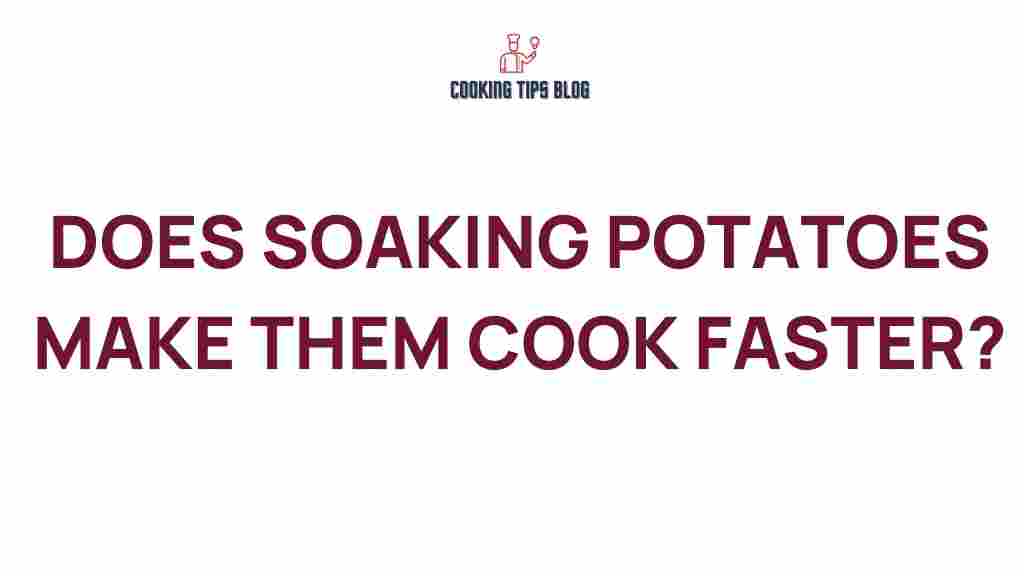Do Soaked Potatoes Really Cook Faster?
Cooking methods often spark debates among home cooks and culinary enthusiasts. One common question that arises is whether soaked potatoes really cook faster. With many people looking for ways to save time in the kitchen, understanding the science of soaked potatoes can lead to more efficient meal preparation. In this article, we’ll delve into the truth behind soaked potatoes, how they affect cooking time, and tips for optimal results.
Understanding Soaked Potatoes
Soaked potatoes refer to potatoes that have been submerged in water for a period of time prior to cooking. The primary reasons for soaking include:
- Reducing cooking time
- Improving texture
- Enhancing flavor absorption
But do these benefits hold up under scrutiny? Let’s explore the mechanics of soaking potatoes and how it impacts their cooking process.
The Science Behind Soaking Potatoes
Soaking potatoes can alter their structure in several ways:
- Starch Gelatinization: Soaking helps to begin the process of starch gelatinization, which can lead to a creamier texture once cooked.
- Moisture Absorption: When potatoes are soaked, they absorb water, which can help them cook more evenly and potentially faster.
- Surface Starch Removal: Soaking can help remove excess surface starch, resulting in crispier edges when frying or roasting.
These factors contribute to the question of whether soaked potatoes cook faster. However, the answer isn’t as straightforward as it may seem.
Do Soaked Potatoes Cook Faster?
While there’s some evidence to suggest that soaked potatoes may cook faster, the difference in cooking time can vary based on several factors:
- Type of Potato: Different varieties, such as russet or Yukon gold, have varying starch content, affecting their cooking times.
- Soaking Duration: The length of time the potatoes are soaked can influence their moisture content.
- Cooking Method: Whether you are boiling, baking, or frying can change how soaked potatoes perform.
In general, soaking potatoes can lead to slightly reduced cooking times, but the difference may not be substantial enough to warrant the extra step for every meal.
Step-by-Step Process for Soaking Potatoes
If you decide to soak your potatoes, here’s a simple step-by-step process:
- Select Your Potatoes: Choose your preferred type of potatoes based on your dish.
- Wash and Peel (if necessary): Clean the potatoes thoroughly under running water. Peel them if you prefer a smoother texture.
- Cut into Uniform Pieces: To ensure even cooking, cut the potatoes into similar-sized pieces.
- Soak in Cold Water: Place the cut potatoes in a bowl and cover them with cold water. Soak for at least 30 minutes, or up to 24 hours for best results.
- Drain and Rinse: After soaking, drain the water and give the potatoes a quick rinse to remove excess starch.
- Cook as Desired: Proceed with your preferred cooking method, whether it’s boiling, baking, or frying.
Common Cooking Methods for Soaked Potatoes
Now that you know how to soak potatoes, let’s look at some popular cooking methods:
- Boiling: Soaked potatoes can be boiled in salted water until tender, usually around 10-15 minutes, depending on size.
- Baking: For baked potatoes, preheat your oven to 400°F (200°C). Soaked potatoes may take about 45-60 minutes to bake.
- Frying: When frying, soaked potatoes can yield crispier results. Fry them in hot oil until golden brown, typically 5-7 minutes.
Troubleshooting Tips for Cooking Soaked Potatoes
Even with the best intentions, you might encounter issues when cooking soaked potatoes. Here are some troubleshooting tips to help you achieve the best results:
- Potatoes Still Hard: If your soaked potatoes are still hard after cooking, they may not have been soaked long enough. Consider soaking for a longer period next time.
- Too Watery Texture: Soaking for too long can lead to a mushy texture. Limit soaking time to 24 hours for best results.
- Sticking Together: If soaked potatoes tend to stick together while cooking, ensure they are well-rinsed before cooking.
Conclusion: The Verdict on Soaked Potatoes
Soaked potatoes can indeed cook faster due to increased moisture absorption and the initial stages of starch gelatinization. However, the actual difference in cooking time may not always be significant enough to justify this extra step for every dish. By understanding the benefits and nuances of soaking, you can enhance your cooking methods and optimize the textures of your meals.
In summary, whether you’re preparing a hearty potato salad, creamy mashed potatoes, or crispy fries, experimenting with soaked potatoes might just yield delicious results. For more tips on cooking techniques, check out this comprehensive guide on cooking potatoes.
So, the next time you’re in a hurry, consider soaking your potatoes to see if it enhances your cooking experience. Happy cooking!
For additional reading, you can also explore the science of cooking potatoes on this external resource.
This article is in the category Tools and created by Cookingtipsblog Team
